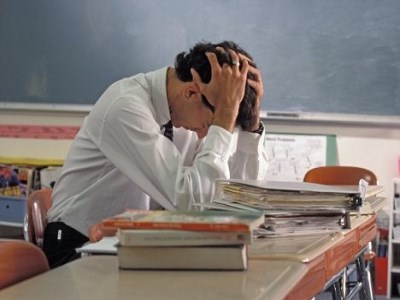
The Victorian Government’s new strategy to help principals ignores the key findings of the Australian Principal Health and Well-being Survey, says the report’s author, Professor Philip Riley.
Riley’s comments follow the Victorian Education Department’s announcement of a state-wide strategy to improve support for principals, who are facing increasing levels of stress, burnout and violent incidents.
In a discussion paper released on Monday, Victorian Education Minister, James Merlino, pledged $4m in funding to support early intervention strategies, specialist advice services, professional development, mental health awareness and coaching for the state’s 1,500 principals.
Meadowglen Primary School principal, Loretta Piazza, who was involved in formulating the strategy, said principals, Melissa Gaddie and Sue North, spent “countless days and hours” traversing the state to identify the most pressing issues of school leaders on a day-to-day basis.
Victorian Principals Association (VPA) president, Anne-Maree Kliman, encouraged school leaders “to be honest” about the issues they face in their role and to use the discussion paper to provide feedback.
“It’s an opportunity for principals to have a real say. It will influence what comes out of this, and what actions will be taken,” Kliman said.
Further consultation on the strategy with the state’s principals will be held over terms three and four and will include workshops and online engagement on the discussion paper.
More than 100 principals and experts have been consulted as part of the strategy’s development so far, giving feedback on the pressures of their profession and how they could be supported better.
However, Professor Philip Riley, who heads the annual Australian Principal Health and Well-being Survey, said the document was “very short on detail and research evidence”, including his own.
“They have overlooked or ignored the key findings of the Australian Principal Health and Well-being Survey,” Riley told The Educator.
“I would have liked to see a greater emphasis on the Department looking at its own processes, which principals almost universally say is a significantly stressful part of their job.”
Riley said well-being has to be “incorporated into all processes of the organisation.”
“It cannot be bolted onto a system that principals do not feel supported by and magically transform it if the existing stressors are not addressed,” he said.
Berwick Lodge Primary School principal, Henry Grossek, told The Educator that the discussion paper is unnecessary because the evidence has already been mounting for more than a decade in all of the areas that the paper discusses.
“You can’t fault is as a document, but the evidence is already out there. You’ve got Phil Riley’s work, the Price and the Privilege report, so there is already enough evidence out there for the Department to take action,” he said.
“In the meantime, it seems as if Rome is burning whilst Nero plays the fiddle.”


